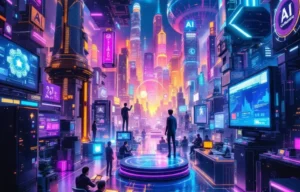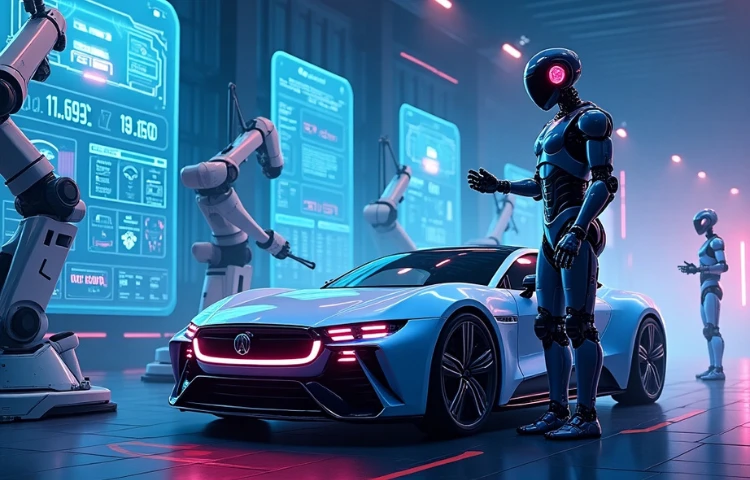

Prefer to listen instead? Here’s the podcast version of this article.
Nvidia, a global leader in AI innovation, made headlines at CES 2025 with transformative advancements in AI technology. The company unveiled groundbreaking initiatives aimed at reshaping the automotive and robotics industries, demonstrating its commitment to leading the AI-driven future. From AI supercomputers to versatile platforms for humanoid robots, Nvidia’s new products promise to empower industries with unparalleled tools for growth and efficiency.
In this blog post, we delve into Nvidia’s major announcements and explore how they align with the company’s mission to revolutionize AI applications in robotics and autonomous systems.
Nvidia introduced the next evolution in graphics technology with the GeForce RTX 50 Series GPUs, powered by its new Blackwell AI processors. These GPUs offer enhanced real-time ray tracing and AI-driven rendering, setting new benchmarks in visual fidelity. For the gaming and content creation communities, this represents a leap forward in graphics and computational power.
But the implications extend beyond gaming. The RTX 50 Series is also geared toward supporting AI-driven tasks, such as training neural networks, 3D simulations, and generative AI applications. For more details on the potential of this technology, visit [AP News’ coverage].
Nvidia’s Project Digits is a game-changer for AI accessibility. This compact, affordable AI supercomputer allows researchers, developers, and businesses to run large-scale AI models with up to 200 billion parameters—no need for costly cloud infrastructure or data centers.
Imagine an independent researcher or startup using this device to create and test AI applications in-house, significantly reducing costs while increasing agility. For a detailed breakdown of its features and use cases, Wired provides an excellent analysis [here].
The Cosmos AI Platform is Nvidia’s latest foray into advancing humanoid robots, industrial robotics, and autonomous vehicles. Using extensive human activity data, Cosmos enables robots to better understand and interact with the physical world.
For example, industrial robots equipped with Cosmos AI could perform complex assembly-line tasks with greater precision, while autonomous vehicles could navigate cities more efficiently by leveraging real-world behavior modeling. For a more comprehensive look, read Wired’s exploration of the Cosmos platform [here].
Nvidia is also helping businesses embrace AI with its Agentic AI Blueprints—a set of tools designed to automate tasks and integrate AI into operations. These blueprints are particularly beneficial for industries like logistics, healthcare, and retail, where efficiency and accuracy are critical.
With these tools, businesses can automate repetitive tasks, optimize workflows, and gain actionable insights from data. For a closer look at Nvidia’s Agentic AI Blueprints and their impact, check out [Investors.com].
In his keynote, Nvidia CEO Jensen Huang emphasized that robotics represents a multi-trillion-dollar opportunity. Nvidia’s AI technologies are at the forefront of enabling this transformation. Collaborations with automotive leaders like Toyota, focusing on autonomous driving systems, underscore the company’s influence across multiple sectors.
Nvidia’s robotics initiatives reflect a growing market demand for automation and AI. For additional insights into the economic potential of robotics, Financial Times offers valuable analysis [here].
Nvidia’s latest innovations unveiled at CES 2025 highlight the company’s determination to redefine industries with AI-powered solutions. By bridging gaps in accessibility with tools like Project Digits, enhancing robotics with the Cosmos AI platform, and pushing the boundaries of graphics with the GeForce RTX 50 Series GPUs, Nvidia is positioning itself as a leader in the AI revolution.
These advancements aren’t just technological marvels; they signal a shift in how businesses, researchers, and industries operate, moving towards a future where AI is deeply integrated into everyday life. As robotics, autonomous vehicles, and AI-driven business tools continue to evolve, Nvidia is paving the way for a smarter, more efficient world.
WEBINAR